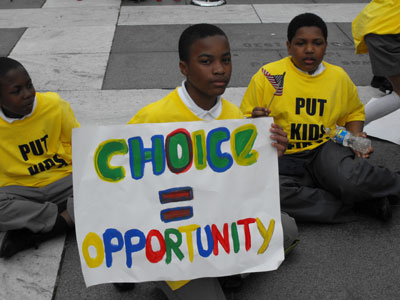Media
Philadelphia School District Faces the Budgetary Music

It doesn’t take an advanced degree to figure out that something’s rotten in the school district of Philadelphia—or that school choice is the antidote. More than half of Philadelphia’s 249 schools do not make Adequate Yearly Progress—they are failing. The school district is also notoriously violent: In 2011 alone, it saw nearly 4,000 violent incidents, including 1,437 assaults on students, 1,076 assaults on staff, 116 indecent assaults, 87 robberies, 37 arsons and 642 weapons possessions. Last year saw 10 rapes in Pennsylvania’s public schools and all 10 were in Philadelphia.
To cap it all, the school district is almost insolvent, trying to plug a $218 million budget gap that is set to balloon to $1.1 billion by 2017. Faced with such woes, the school district is proposing some serious restructuring:
The plan—subject to public comment and (School Reform Commission) approval—would close 40 schools next year and 64 by 2017, move thousands more students to charters, and dismantle the central office in favor of “achievement networks” that would compete to run groups of 25 schools and would sign performance-based contracts.
As it happens, school choice in the form of Philadelphia charter schools—which have nearly 41,000 students—already saves more than $200 million on public education. That’s because charter schools, on average, spend just 83 percent of what traditional public schools spend per student. The School District of Philadelphia retains more than $5,000 in funding for every child that moves to a charter school.
Ultimately, Philadelphia needs more school choice, not less. Opportunity Scholarships or a significant increase to the Educational Improvement Tax Credit would allow parents to use education tax dollars at the school of their choice, and grant an immediate escape to desperate families trapped by their ZIP code in violent, failing schools. It’s good that Philadelphia school officials finally see the need to spend more efficiently, but that’s a small step toward comprehensive—and necessary— education reform.